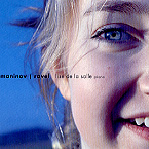This music doesn’t exactly suffer from catalog underexposure, yet Lise de la Salle’s clear, direct, and musically sound performances are worth your attention. Pedaling sparingly, de la Salle’s well-honed technique permits her to negotiate Rachmaninov’s vertigo-inducing runs, rapid chords, and cruel jumps in the sixth and ninth Op. 33 and Op. 39 No. 1 Études-Tableaux with controlled legato and full-bodied tone. You could imagine added flexibility and purple passion, but the playing is beautiful and assured just the same.
Likewise, the pianist’s crisp, eager articulation throughout Ravel’s Sonatine and Miroirs misses some of the music’s delicacy (Noctuelles is brusque, breathless, and notey, for example) but virtually none of its character and contrasts. Alborada del gracioso’s sultry heels truly click, and the textural layers in La vallée des cloches beautifully float over the barlines. I hope de la Salle eventually spices up her Ravelian palette with more color and sensuality–but give the kid a break: she’s only 14!
































